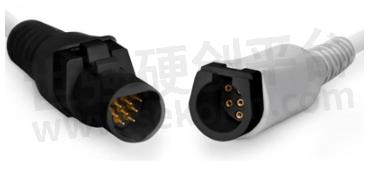Smiths Interconnect Connectors D Series for Medical Devices Autoclaving

Autoclaving is often useD to sterilize medical devices to prevent disease transmission both in new and reusable products. Autoclaves sterilize by introducing high-pressure steam into a chamber containing the objects to be sterilized. Therefore, these devices must be able to withstand autoclaving temperatures in the range of 135℃ without damage, deformation, or disintegration.
Autoclave sterilization of mechanical surgical and dental instruments used in invasive procedures is well known and has been used for many decades to assure the equipment is free of dangerous contamination (viruses, bacteria, fungus, etc.). Traditionally, these instruments are made of metals (such as stainless steel or anodized aluminum) that can easily withstand the autoclave environment. Similarly, electronic medical equipment often must also be sterilized between patients, but since these typically contain plastic components, care must be taken to choose plastics that will endure many of these steam sterilization cycles. The connectors used on these medical devices need to bear the autoclave environment as well. However connectors can be made with a variety of plastics, so to be autoclavable, the plastic from which these are crafted must not melt, deflect, or change their electrical properties during the process.
To assure that connectors can be used in applications requiring autoclave sterilization, a range of tests should be performed:
Low-Level Contact Resistance Test (Specification: EIA-364-23C)
Mating/Unmating Force (Durability) Test (Specification: EIA-364-09C / EIA-364-13D)
Dielectric Withstanding Voltage (DWV) Test (Specification: EIA-364-20E)
Autoclavable D Series
Designed to withstand up to 20 autoclave cycles, D Series delivers industry-leading performance featuring simple push-button latching and a "D" shaped flange which makes mating orientation obvious. There are three D Series sizes that accommodate a wide variety of applications. The intuitive and durable D Series is recognized for its ease of use and high reliability.

Conclusion
Connectors made of high-temperature Ultem polyetherimide plastic should exhibit little or no change in performance after exposure to multiple autoclave sterilization cycles that are typically used in medical applications. Connectors like the D Series have met these testing requirements and therefore are suitable for use in medical device designs that require this type of sterilization between uses.
- +1 Like
- Add to Favorites
Recommend
- Smiths Interconnect Offered Isolators to Support NASA’s Europa Clipper Mission to Explore Jupiter’s Moon
- Smiths Interconnect’s DaVinci 112 High-Speed Test Socket Wins Best Test Measurement Award at the 2024 Global Electronics Achievement Awards
- How Smiths Interconnect Keeps The Medical World Connected
- Smiths Interconnect Acquires Reflex Photonics to Expand in High Speed Data Transmission Market
- Smiths Interconnect Expands into Burn-In Test Market with Acquisition of Plastronics
- Smiths Interconnect Hypertac Green Connect: A Game-changer in the Battery Electric Vehicles Industry
- An Introduction to Smiths Interconnect in Dundee
- Smiths Interconnect New Hypertac Green Connect Contact Technology is Designed to Reduce Power Loss
This document is provided by Sekorm Platform for VIP exclusive service. The copyright is owned by Sekorm. Without authorization, any medias, websites or individual are not allowed to reprint. When authorizing the reprint, the link of www.sekorm.com must be indicated.






























































































































































































































































































































































































































































































































































































































































































































































































































































































